Claude Forthomme's Blog, page 49
March 4, 2013
How Amazon could Improve Book Reviews

Happy with the quality of book reviews on Amazon? Do you read them before deciding on a book purchase - or even to just download a sample? Or do you go to the list of the top hundred best selling titles in the genre you like and stop there?
I suspect most people go to Amazon to buy a book they've heard about on Goodreads, generally considered the best book review site, or perhaps read about in the papers or a blog. If that's the case, it's a pity because Amazon has done a lot to make book pages as informative as possible. There's plenty of good stuff to be found on a book page, ranging from customer reviews neatly ranked by stars (one star = "I hate it" to 5 stars = "I love it") to lists of books purchased by other customers ("Customers who bought this item also bought..."), not to mention "highlights and notes" and forums and all sorts of goodies...
To Amazon's eternal credit one should point out that the book's sales ranking is hidden in the "book details" while customer reviews are in the forefront, like this (I took here the case of one of my books):

Yet there are problems with reviews and Amazon is well aware of them. Recently, the Big Zon went on the war path against reviews by family and friends and pulled down the so-called "sock puppet" reviews - in the process making many people angry because it took aim at reviews done by writers in the same genre. That was no doubt an error - it is standard practice in the publishing industry to ask for reviews from "people in the know", literary critics who are experts in
the genre and recognized authors working in the same genre. One may expect Amazon to recant and return to a more reasonable stance on reviews.
But there is no doubt that the review system is not perfect and could be vastly improved. With its technical capability, Amazon ought to be able to improve the standard review done by readers who are neither literary critics nor expert authors, just people who love to read. True, Amazon has set up review guidelines that are very clear and readable but I'm not sure many people look at them before posting their reviews.
Surely, a more "guided process" could be electronically set up. For the time being, the star ranking is entirely subjective: you're asked to assign stars on the basis of an overall like/dislike, no need to provide supporting evidence for your choice. Instead of clicking on the stars to establish the ranking, why not ask a few simple questions in either a pop-up window or a drop-down menu that would "guide" the number of stars awarded, ensuring that all the main features of a novel are taken into account?
Let's take the case of fiction (obviously different questions would need to be developed for non-fiction): we all know that a novel's quality is based on a number of aspects, the same for all novels: the quality of character development, plot, setting etc. One could take, for example, the 8 points that the judges on the SLO NightWriters Contest use to evaluate entries:
1)Beginning/Ending,
2)Character,
3)Dialogue,
4)Narrative Voice & Point of View,
5)Description of
Setting,
6)Emotional Impact,
7)Plot / Story Arc,
8)Use of Language.
My proposal is simple enough: ask readers to rate the book on a scale of 5, from bad = 1 to excellent = 5 for each of the above points, and once all the aspects are rated, poof! There you have it, it's electronic magic, your 5 star rating would be all done, synthesizing all 8 points! Ok, perhaps 8 points to score a book are too many and could be reduced to 4 or 5, but something like that would force people to think before assigning stars and make the whole rating system a lot more objective and based on observation. The very same points should also help readers in writing up their review, drawing their attention to the criteria they should refer to when passing judgment.
One additional plus: if Amazon does this well, it could even be fun to watch the results of one's choices translate in a particular number of stars...
This is just a modest proposal to improve the quality of book reviews on Amazon, a simple electronic tweak but it might work wonders to make the system more reliable as a guide to book discovery. Because, when all is said and done, book reviews, aside from word of mouth, remain the single biggest tool for discovering new good reads!
What do you think of this idea? What other suggestions would you have to improve Amazon's book review system?
Related articles
 What Are The Best Book Review Sites?(makeuseof.com)
What Are The Best Book Review Sites?(makeuseof.com) Group looks to create Rabble, an aggregated book review site for indie and traditional books(teleread.com)
Group looks to create Rabble, an aggregated book review site for indie and traditional books(teleread.com) Goodreads Reviewed: A Must-Use Site For Any Book Lover(makeuseof.com)
Goodreads Reviewed: A Must-Use Site For Any Book Lover(makeuseof.com)

Published on March 04, 2013 07:48
March 1, 2013
Discover Boomer lit in an Easy Fun Way every Friday
One of the member of our Goodreads Group discussing Boomer literature, author of The Prince Charming Hoax, has set up a special website where you can quickly discover good reads in Boomer lit through the simple system of reading snippets of boomer novels listed there, new books coming up every Friday.
This new site is called Boomer Lit Friday and you can find it here. This is where the links to the blogs of participating authors are listed, and if you click on the links, you are taken straight to the blogs of participating authors where you can read snippets of their work.
This is a fun way
for you to see all sorts of boomer books, from thrillers to romance, and
if you hop from one blog to the next, you'll get a pretty good idea of
the range and depth of boomer lit. I shall participate four Fridays in this Boomer Lit Friday Blog Hop, starting with today.
So here is the snippet of my boomer novel A HOOK IN THE SKY, the story of a top manager at the UN, who decides upon retirement that he wants to become an
artist. Alas, his academic paintings distress his much younger wife, a chic
Manhattan socialite who is passionate about contemporary art and runs a
gallery in Chelsea. They fight over art - he’s square, she’s cool - but
what is at stake is their marriage. Soon they separate, other
women enter Robert's life, including a sexy and deeply troubled young
woman and that is only the beginning of his troubles...
To make matters simple, here are the opening lines of the novel:
Chapter
One Napoleon in tears
Julie stuck her head of
curly red hair through the door. “Robert, it’s time to go! You’ve got less than five
minutes before the start of the meeting!” She pronounced his name the French way: Rob-air, without sounding the “t”. He liked the way she said it. She drew out
the “air”, rolling it softly in her English mouth. He
was going to miss her, his ever-so-efficient secretary. The round face, the
freckles, the constant smile and her mothering him, always reminding him of his
next appointment.
That damn farewell
speech. He stared at it, ten pages, double spaced, in 16 point font… It looked very, very big – unwieldy.
That was Julie’s idea to make it easy to read. He didn’t like it. Was he really going to read it aloud? Every word?
No, better try to deliver the speech from the hip, a
parting shot, in the throes of sacred inspiration. Ha! And watch Napoleon (his
nickname for the Big Boss) stumble back, full of admiration.
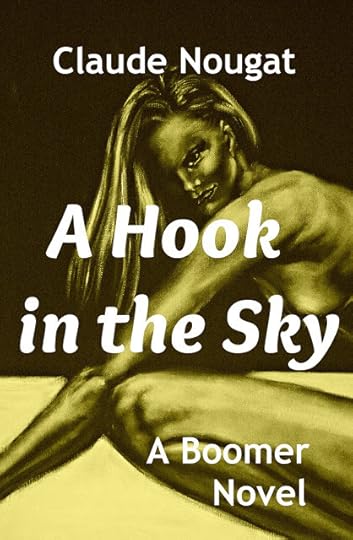
You guessed it...That's the beautiful young woman who enters Robert's life and he paints her in the nude, passionately...
TO FIND OTHER BOOMER BOOKS IN THE FRIDAY BLOG HOP, click here.
A Hook in the Sky is available on Amazon in digital and paperback : click here. If you have a minute, tell me how you like the opening...Next time, I'll post juicy tidbits chosen further down in the book, look for them every Friday!


This new site is called Boomer Lit Friday and you can find it here. This is where the links to the blogs of participating authors are listed, and if you click on the links, you are taken straight to the blogs of participating authors where you can read snippets of their work.
This is a fun way
for you to see all sorts of boomer books, from thrillers to romance, and
if you hop from one blog to the next, you'll get a pretty good idea of
the range and depth of boomer lit. I shall participate four Fridays in this Boomer Lit Friday Blog Hop, starting with today.
So here is the snippet of my boomer novel A HOOK IN THE SKY, the story of a top manager at the UN, who decides upon retirement that he wants to become an
artist. Alas, his academic paintings distress his much younger wife, a chic
Manhattan socialite who is passionate about contemporary art and runs a
gallery in Chelsea. They fight over art - he’s square, she’s cool - but
what is at stake is their marriage. Soon they separate, other
women enter Robert's life, including a sexy and deeply troubled young
woman and that is only the beginning of his troubles...
To make matters simple, here are the opening lines of the novel:
Chapter
One Napoleon in tears
Julie stuck her head of
curly red hair through the door. “Robert, it’s time to go! You’ve got less than five
minutes before the start of the meeting!” She pronounced his name the French way: Rob-air, without sounding the “t”. He liked the way she said it. She drew out
the “air”, rolling it softly in her English mouth. He
was going to miss her, his ever-so-efficient secretary. The round face, the
freckles, the constant smile and her mothering him, always reminding him of his
next appointment.
That damn farewell
speech. He stared at it, ten pages, double spaced, in 16 point font… It looked very, very big – unwieldy.
That was Julie’s idea to make it easy to read. He didn’t like it. Was he really going to read it aloud? Every word?
No, better try to deliver the speech from the hip, a
parting shot, in the throes of sacred inspiration. Ha! And watch Napoleon (his
nickname for the Big Boss) stumble back, full of admiration.

You guessed it...That's the beautiful young woman who enters Robert's life and he paints her in the nude, passionately...
TO FIND OTHER BOOMER BOOKS IN THE FRIDAY BLOG HOP, click here.
A Hook in the Sky is available on Amazon in digital and paperback : click here. If you have a minute, tell me how you like the opening...Next time, I'll post juicy tidbits chosen further down in the book, look for them every Friday!


Published on March 01, 2013 05:52
February 27, 2013
What is More Powerful: Book or Film? The Written Word or the Visual?
A good portion of movies are based on books, some 30 to 40%. A no-brainer would be to promote books with movie tie-ins as leads, something a new app free on Apple called The Nudge List is doing. It's based on a clever website, nudgemenow.com that does just that - among other nice things.
And the other things are all visual, that's the truly interesting feature of this brand new site. Lots of movie trailers - not just book covers as is usually the case with book sellers. Result? It's much more fun to look at than Goodreads or Bookish. See here:
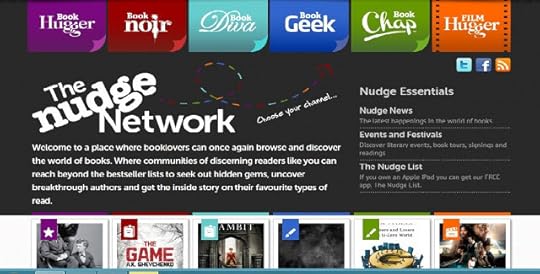
You don't believe me? Compare with the home page of Bookish, the new site set up by the big publishers (Hachette, Penguin and Simon and Shuster):
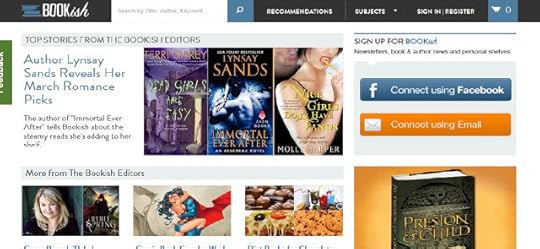
Or take a look at another book discovery site, Small Demons:

Yes, lots and lots of book covers here - a bit of a visual jumble, isn't it?
In my view, the Nudge Network has a cleaner, more appealing look and has content going beyond book covers: it reports on book events, festivals and of course movies. Once a week, on Friday, it will bring you new reads and tell you what's hot. According to Publishing Perspectives (see article here) it started off with a bang, 7,000 downloads of the App in its first 7 days of life. Interestingly, over 72% of visitors reportedly bought a book directly as a result of their visit to the site.
If that's true, that's amazing - particularly considering that the site does NOT give reading snippets or samples. That suggests people are buying blind to the written word and only moved to purchase through the sheer power of pictures! As one of the founder of the App told Publishing Perspectives, “There is nothing else out that gives you curation in such a very visual
form, and discoverability is not something that Amazon is any good at.”
Yes, there is no doubt that book discovery is not something Amazon is particularly good at (see my recent post on the subject, here). And it probably explains the success of this kind of site - or at least, why there is space for setting up such sites.
Whether this visual approach will work or not, we'll see - it's too soon to tell. The Nudge Network is like David against the Goliath that is Bookish, yet the latter, in spite of the sums and efforts invested, appears to have had limited success so far. Ditto for Small Demons. Many people argue that for book discovery nothing can replace word of mouth and reviews.
But reviews are not visual - worse, they can be boring while images rarely are. So is The Nudge Network showing a way forward? What do you think?
Related articles
 Bookish Has a Dirty Little Secret(the-digital-reader.com)
Bookish Has a Dirty Little Secret(the-digital-reader.com)
 Book Discoverability(tezmilleroz.wordpress.com)
Book Discoverability(tezmilleroz.wordpress.com)
 Big Three Publishers Come at Amazon with a New Retailing Site(slog.thestranger.com)
Big Three Publishers Come at Amazon with a New Retailing Site(slog.thestranger.com)
 Goodreads Survey Shows 86% of Tablet Owners Read on Them, 32% Don't Read Anywhere Else(the-digital-reader.com)
Goodreads Survey Shows 86% of Tablet Owners Read on Them, 32% Don't Read Anywhere Else(the-digital-reader.com)


And the other things are all visual, that's the truly interesting feature of this brand new site. Lots of movie trailers - not just book covers as is usually the case with book sellers. Result? It's much more fun to look at than Goodreads or Bookish. See here:

You don't believe me? Compare with the home page of Bookish, the new site set up by the big publishers (Hachette, Penguin and Simon and Shuster):

Or take a look at another book discovery site, Small Demons:

Yes, lots and lots of book covers here - a bit of a visual jumble, isn't it?
In my view, the Nudge Network has a cleaner, more appealing look and has content going beyond book covers: it reports on book events, festivals and of course movies. Once a week, on Friday, it will bring you new reads and tell you what's hot. According to Publishing Perspectives (see article here) it started off with a bang, 7,000 downloads of the App in its first 7 days of life. Interestingly, over 72% of visitors reportedly bought a book directly as a result of their visit to the site.
If that's true, that's amazing - particularly considering that the site does NOT give reading snippets or samples. That suggests people are buying blind to the written word and only moved to purchase through the sheer power of pictures! As one of the founder of the App told Publishing Perspectives, “There is nothing else out that gives you curation in such a very visual
form, and discoverability is not something that Amazon is any good at.”
Yes, there is no doubt that book discovery is not something Amazon is particularly good at (see my recent post on the subject, here). And it probably explains the success of this kind of site - or at least, why there is space for setting up such sites.
Whether this visual approach will work or not, we'll see - it's too soon to tell. The Nudge Network is like David against the Goliath that is Bookish, yet the latter, in spite of the sums and efforts invested, appears to have had limited success so far. Ditto for Small Demons. Many people argue that for book discovery nothing can replace word of mouth and reviews.
But reviews are not visual - worse, they can be boring while images rarely are. So is The Nudge Network showing a way forward? What do you think?
Related articles
 Bookish Has a Dirty Little Secret(the-digital-reader.com)
Bookish Has a Dirty Little Secret(the-digital-reader.com) Book Discoverability(tezmilleroz.wordpress.com)
Book Discoverability(tezmilleroz.wordpress.com) Big Three Publishers Come at Amazon with a New Retailing Site(slog.thestranger.com)
Big Three Publishers Come at Amazon with a New Retailing Site(slog.thestranger.com) Goodreads Survey Shows 86% of Tablet Owners Read on Them, 32% Don't Read Anywhere Else(the-digital-reader.com)
Goodreads Survey Shows 86% of Tablet Owners Read on Them, 32% Don't Read Anywhere Else(the-digital-reader.com)

Published on February 27, 2013 07:44
February 26, 2013
Italian Election Results: Government Deadlock, Euro Exit?
Italian election results are in and the winner is...Beppe Grillo and his Five Star Movement!

Yesterday, I had predicted a deadlock between the three coalitions: on the left, the PD (Democratic Party of Pier Luigi Bersani), on the right, the PDL (Popolo delle Libertà of Silvio Berlusconi) and placed neither on the left or the right, the total newcomer, the Five Star Movement of Beppe Grillo, a notorious comic, the sort of man who crossed the channel swimming when he went to Sicily for his campaign. In all this, Monti, the premier of the "technical" government that over the past year had imposed austerity measures that were widely hated, was predicted to come in last, around 10 percent of the votes. And the largest party, as always, was predicted to be absenteism.
All my predictions (alas!) came to pass.
The absentee vote was the largest: 35% of the electorate didn't vote, 5 % more than at the last elections in 2008. Monti got in around 10% , Beppe Grillo turned out to be the biggest party at the Chamber of Deputies with over 25% of the vote, though he cannot control the Chamber because, under the present electoral system, there is a premium of seats awarded to the winning coalition, and the PD of Bersani together with Monti obtain over 40%, thus ending in pole position - something that is currently contested by Berlusconi's PDL whose 30% result trails closely the PD by a gap that could be so close that it would be what Americans call "too close to call".
Putting aside this squabble (which may require a decision from the Italian courts), the most probable outcome is a left coalition in control of the Chamber of Deputies, and Berlusconi's right coalition in control of the Senate - with Beppe Grillo's movement awarded a consistent share of seats in both chambers. Such a big share that Grillo could become the deciding factor, what the Italians call "l'ago della bilancia".
So now we know that Italy is really in the hands of a couple of buffoons: Berlusconi and Grillo, with the latter in a possible watchdog position.
We also know the exact size of Italians' protest against their political class - they call it disdainfully "la casta", the caste. Fully 35% of Italians didn't vote basically because they didn't know who to vote for. And 25% voted for Beppe Grillo whose movement was born three years ago and whose political platform is pure protest: he appeals to everyone who's angry about something from corruption to political privileges and clientelism, unemployment - 2 out of 3 youth is looking for a job - destruction of the environment and cultural heritage etc etc. The list is long. That's sixty percent of Italians!
To this you could add the vote for Monti, a totally new figure on the
political scene as well as Nicchi Vendola and Matteo Renzi on the left who's the young and attractive mayor of Florence - taken
together, another 25 percent which however have to be counted within the leftist coalition led by Pier Luigi Bersani.

Matteo Renzi, Mayor of Florence
This whole wave of protest is similar to the Indignados in Spain and the Occupy Wall Street movement in America. People across the board - the famous 99 percent - are fed up with injustice, privilege and ethical laxity!
Interested in the exact numbers? You can check them here. But what I'm interested in is the result this election will have on Italy's economy and more generally on Europe and the Euro - which also eventually reflects on the US and the whole world.
Results in terms of the stock markets, in particular the Italian MIB, were immediate this morning: it plunged! So did the Euro while the famous "spread" (the difference between the cost of raising funds for the Italian government compared to the German) immediately climbed over 333 points and is likely to be as bad as it was when Monti was called in to form a "technical government" to "save" Italy from bankruptcy back in the fall of 2011 when Berlusconi resigned.
A worse-case scenario would have Italy returning to the terrible days of 2011 with a collapse of the ability of the government to finance itself (read: bankruptcy) and exit from the Euro. What next? I don't like to contemplate it. A collapse of the banking system, evaporation of pensions and savings, generalized unemployement and shutting down of the industrial system. Worse than the Great Depression! With obvious effects on the European Union since Italy is the fourth largest economy in Europe or possibly the third, after Germany and France and vying for third position with the UK.
The shock waves would rock the world, US and China included.
Is all this really likely? Call me an optimist, but I don't think so.
There are two reasons why this may not happen. One is technical: markets have probably already discounted the election result. For quite a while now, investors expected elections to result in a stalled situation, possibly an impossibility to govern the country and an early return to elections. The second reason is more political: will the "Grillini" (as the Italians call the new party) really cause the country to grind to a halt? My bet is that they won't. Beppe Grillo has already announced that over the next 6 months he will do his best to actuate his electoral promises. Of course, politicians always say that.
And what does his platform consist in? It is based on five simple ideas, five overall issues - the five that give the name to his movement: public water, sustainable mobility, development,
connectivity, and environmentalism. This is not a consistent program but rather a mixed bag of ecologism, leftist ideology and masterful use of the web, hence the appeal to young Italians. In short, a moveable feast that pulls together many different tendencies and points of views, united only by a common spirit of protest.
If my reading of the nature of Beppe Grillo's movement is correct, then this is a party that will never align with Berlusconi but will, on the other hand, occasionally align with Bersani's leftist coalition. Which means that Bersani will likely be able to form a government with Monti and get most of the needed laws passed - except for a few that the Five Movement will stop as it sees fit.
In short, the Italian political caste now has a Big Brother watching it, Beppe Grillo!
Related articles
 Italy deadlock after protest vote(bbc.co.uk)
Italy deadlock after protest vote(bbc.co.uk)
 Huge Protest Vote Leaves Italy Facing Deadlock(huffingtonpost.com)
Huge Protest Vote Leaves Italy Facing Deadlock(huffingtonpost.com)
 Italy election sparks fresh fears for euro(guardian.co.uk)
Italy election sparks fresh fears for euro(guardian.co.uk)
 Grillo's Anti-Austerity Wave Crashes Into Italian Parliament - Bloomberg(bloomberg.com)
Grillo's Anti-Austerity Wave Crashes Into Italian Parliament - Bloomberg(bloomberg.com)



Yesterday, I had predicted a deadlock between the three coalitions: on the left, the PD (Democratic Party of Pier Luigi Bersani), on the right, the PDL (Popolo delle Libertà of Silvio Berlusconi) and placed neither on the left or the right, the total newcomer, the Five Star Movement of Beppe Grillo, a notorious comic, the sort of man who crossed the channel swimming when he went to Sicily for his campaign. In all this, Monti, the premier of the "technical" government that over the past year had imposed austerity measures that were widely hated, was predicted to come in last, around 10 percent of the votes. And the largest party, as always, was predicted to be absenteism.
All my predictions (alas!) came to pass.
The absentee vote was the largest: 35% of the electorate didn't vote, 5 % more than at the last elections in 2008. Monti got in around 10% , Beppe Grillo turned out to be the biggest party at the Chamber of Deputies with over 25% of the vote, though he cannot control the Chamber because, under the present electoral system, there is a premium of seats awarded to the winning coalition, and the PD of Bersani together with Monti obtain over 40%, thus ending in pole position - something that is currently contested by Berlusconi's PDL whose 30% result trails closely the PD by a gap that could be so close that it would be what Americans call "too close to call".
Putting aside this squabble (which may require a decision from the Italian courts), the most probable outcome is a left coalition in control of the Chamber of Deputies, and Berlusconi's right coalition in control of the Senate - with Beppe Grillo's movement awarded a consistent share of seats in both chambers. Such a big share that Grillo could become the deciding factor, what the Italians call "l'ago della bilancia".
So now we know that Italy is really in the hands of a couple of buffoons: Berlusconi and Grillo, with the latter in a possible watchdog position.
We also know the exact size of Italians' protest against their political class - they call it disdainfully "la casta", the caste. Fully 35% of Italians didn't vote basically because they didn't know who to vote for. And 25% voted for Beppe Grillo whose movement was born three years ago and whose political platform is pure protest: he appeals to everyone who's angry about something from corruption to political privileges and clientelism, unemployment - 2 out of 3 youth is looking for a job - destruction of the environment and cultural heritage etc etc. The list is long. That's sixty percent of Italians!
To this you could add the vote for Monti, a totally new figure on the
political scene as well as Nicchi Vendola and Matteo Renzi on the left who's the young and attractive mayor of Florence - taken
together, another 25 percent which however have to be counted within the leftist coalition led by Pier Luigi Bersani.

Matteo Renzi, Mayor of Florence
This whole wave of protest is similar to the Indignados in Spain and the Occupy Wall Street movement in America. People across the board - the famous 99 percent - are fed up with injustice, privilege and ethical laxity!
Interested in the exact numbers? You can check them here. But what I'm interested in is the result this election will have on Italy's economy and more generally on Europe and the Euro - which also eventually reflects on the US and the whole world.
Results in terms of the stock markets, in particular the Italian MIB, were immediate this morning: it plunged! So did the Euro while the famous "spread" (the difference between the cost of raising funds for the Italian government compared to the German) immediately climbed over 333 points and is likely to be as bad as it was when Monti was called in to form a "technical government" to "save" Italy from bankruptcy back in the fall of 2011 when Berlusconi resigned.
A worse-case scenario would have Italy returning to the terrible days of 2011 with a collapse of the ability of the government to finance itself (read: bankruptcy) and exit from the Euro. What next? I don't like to contemplate it. A collapse of the banking system, evaporation of pensions and savings, generalized unemployement and shutting down of the industrial system. Worse than the Great Depression! With obvious effects on the European Union since Italy is the fourth largest economy in Europe or possibly the third, after Germany and France and vying for third position with the UK.
The shock waves would rock the world, US and China included.
Is all this really likely? Call me an optimist, but I don't think so.
There are two reasons why this may not happen. One is technical: markets have probably already discounted the election result. For quite a while now, investors expected elections to result in a stalled situation, possibly an impossibility to govern the country and an early return to elections. The second reason is more political: will the "Grillini" (as the Italians call the new party) really cause the country to grind to a halt? My bet is that they won't. Beppe Grillo has already announced that over the next 6 months he will do his best to actuate his electoral promises. Of course, politicians always say that.
And what does his platform consist in? It is based on five simple ideas, five overall issues - the five that give the name to his movement: public water, sustainable mobility, development,
connectivity, and environmentalism. This is not a consistent program but rather a mixed bag of ecologism, leftist ideology and masterful use of the web, hence the appeal to young Italians. In short, a moveable feast that pulls together many different tendencies and points of views, united only by a common spirit of protest.
If my reading of the nature of Beppe Grillo's movement is correct, then this is a party that will never align with Berlusconi but will, on the other hand, occasionally align with Bersani's leftist coalition. Which means that Bersani will likely be able to form a government with Monti and get most of the needed laws passed - except for a few that the Five Movement will stop as it sees fit.
In short, the Italian political caste now has a Big Brother watching it, Beppe Grillo!
Related articles
 Italy deadlock after protest vote(bbc.co.uk)
Italy deadlock after protest vote(bbc.co.uk) Huge Protest Vote Leaves Italy Facing Deadlock(huffingtonpost.com)
Huge Protest Vote Leaves Italy Facing Deadlock(huffingtonpost.com) Italy election sparks fresh fears for euro(guardian.co.uk)
Italy election sparks fresh fears for euro(guardian.co.uk) Grillo's Anti-Austerity Wave Crashes Into Italian Parliament - Bloomberg(bloomberg.com)
Grillo's Anti-Austerity Wave Crashes Into Italian Parliament - Bloomberg(bloomberg.com)

Published on February 26, 2013 01:54
February 25, 2013
Elections in Italy: The Country in the Hands of Buffoons!
Election polls are closing now as I write but we already know that Italy is in the hands of populist buffoons. Exit polls may show unclear results as the three major blocs of votes are head to head and we probably won't know for sure who won before tomorrow.
Consider the situation (this is in rough terms):
A little over a third of the votes goes to the big leftist party, the Partito Democratico, historic heir to the now defunct Communist Party, the so-called "Center Left Coalition": the question is how much over 33% and whether the government coming out of the election can govern with the support of Monti who's hated by the Italian electors who cannot forgive him his policies of austerity, the property tax and attempts at labor reform;
One third of the votes - or maybe more? - goes to the "Center Right Coalition" once again led by a Silvio Berlusconi revived from the
dead and confirmed false comedian, singer and lover of bunga-bunga parties and
young girls (in spite of his 76 years); but Italians love his lies and
false promises of giving back the property tax raised by the "technical"
Monti government: he's conveniently forgotten that before resigning
from the government a year ago he had himself signed a letter of promise
to the European Union, the IMF and the European Central Bank that he
would raise taxes and balance the budget; he left Monti to do the dirty
work but no one seems to remember his role in this story...
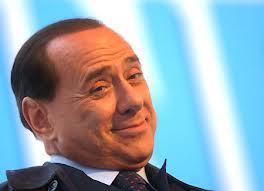
Another third of the vote - or maybe less? - goes to the Five-Star Movement led by Beppe Grillo, a real comedian, termed by French commentators the "Coluche" of the situation, a man with no political program and no ideas beyond vocal protest who loudly closed his campaign with the vulgar expletive "Vaffan culo..." (I'm not translating that!)
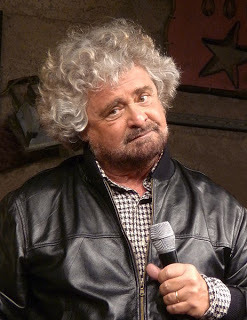
And Prime Minister Monti in all this, leading the "Centrist Coalition"? Just a few percentage points, around 10% if that, obviously the loser...
Other big absentees: some 45% of voters, maybe more - in any case a huge percentage: too many Italians do not like exercising their voting right, which means that Italian democracy is left in the hands of ... comedians!
I'm not kidding: Berlusconi and Beppe Grillo taken together account for some 60% of the vote!
LATEST UPDATE: Here are the early numbers after the polls closed:
The Sky poll for the Senate:
Centre-left coalition (Bersani): 37%
Centre-right coalition (Berlusconi): 31%
Five Star Movement (Grillo): 16.5%
Centrist coalition (Monti): 9%
La Stampa is reporting for the Chamber of Deputies:
Centre-left coalition (Bersani): 34.5%
Centre-right coalition (Berlusconi): 29%
Five Star Movement (Grillo): 19%
Centrist coalition (Monti): 9.5%
There were also regional elections in some of the major provinces (Lombardy, Lazio...) but all eyes are trained on the main elections as people in Europe wonder whether Italy will continue with the policies set by the Monti government or not, and perhaps even fall out of the Eurozone if Berlusconi actually does what he promised to do...
Early results are somewhat encouraging: it looks like Beppe Grillo didn't make it - not really - and that he probably weakened Berlusconi's hand. If so, then the future is looking better for Italy.
If not - then Povera Italia, quo vadis? Where are you going? Some people are already talking about new elections as soon as 2015 but (I think) that's being a little too pessimistic.
It looks like Italy decided not to follow Grillo/Coluche down the road of systematic political obstruction...Let's hope so!
 Cover of Coluche
Cover of Coluche
Related articles
 Protest votes increase uncertainty in Italy election(reuters.com)
Protest votes increase uncertainty in Italy election(reuters.com)
 Italy Goes To Polls In Crucial Election(huffingtonpost.com)
Italy Goes To Polls In Crucial Election(huffingtonpost.com)
 Italians Vote With Berlusconi Challenging Monti Austerity(bloomberg.com)
Italians Vote With Berlusconi Challenging Monti Austerity(bloomberg.com)
 GOLDMAN: There's Almost A 50% Chance Of A Negative Outcome In Italy Tomorrow(businessinsider.com)
GOLDMAN: There's Almost A 50% Chance Of A Negative Outcome In Italy Tomorrow(businessinsider.com)


Consider the situation (this is in rough terms):
A little over a third of the votes goes to the big leftist party, the Partito Democratico, historic heir to the now defunct Communist Party, the so-called "Center Left Coalition": the question is how much over 33% and whether the government coming out of the election can govern with the support of Monti who's hated by the Italian electors who cannot forgive him his policies of austerity, the property tax and attempts at labor reform;
One third of the votes - or maybe more? - goes to the "Center Right Coalition" once again led by a Silvio Berlusconi revived from the
dead and confirmed false comedian, singer and lover of bunga-bunga parties and
young girls (in spite of his 76 years); but Italians love his lies and
false promises of giving back the property tax raised by the "technical"
Monti government: he's conveniently forgotten that before resigning
from the government a year ago he had himself signed a letter of promise
to the European Union, the IMF and the European Central Bank that he
would raise taxes and balance the budget; he left Monti to do the dirty
work but no one seems to remember his role in this story...

Another third of the vote - or maybe less? - goes to the Five-Star Movement led by Beppe Grillo, a real comedian, termed by French commentators the "Coluche" of the situation, a man with no political program and no ideas beyond vocal protest who loudly closed his campaign with the vulgar expletive "Vaffan culo..." (I'm not translating that!)

And Prime Minister Monti in all this, leading the "Centrist Coalition"? Just a few percentage points, around 10% if that, obviously the loser...
Other big absentees: some 45% of voters, maybe more - in any case a huge percentage: too many Italians do not like exercising their voting right, which means that Italian democracy is left in the hands of ... comedians!
I'm not kidding: Berlusconi and Beppe Grillo taken together account for some 60% of the vote!
LATEST UPDATE: Here are the early numbers after the polls closed:
The Sky poll for the Senate:
Centre-left coalition (Bersani): 37%
Centre-right coalition (Berlusconi): 31%
Five Star Movement (Grillo): 16.5%
Centrist coalition (Monti): 9%
La Stampa is reporting for the Chamber of Deputies:
Centre-left coalition (Bersani): 34.5%
Centre-right coalition (Berlusconi): 29%
Five Star Movement (Grillo): 19%
Centrist coalition (Monti): 9.5%
There were also regional elections in some of the major provinces (Lombardy, Lazio...) but all eyes are trained on the main elections as people in Europe wonder whether Italy will continue with the policies set by the Monti government or not, and perhaps even fall out of the Eurozone if Berlusconi actually does what he promised to do...
Early results are somewhat encouraging: it looks like Beppe Grillo didn't make it - not really - and that he probably weakened Berlusconi's hand. If so, then the future is looking better for Italy.
If not - then Povera Italia, quo vadis? Where are you going? Some people are already talking about new elections as soon as 2015 but (I think) that's being a little too pessimistic.
It looks like Italy decided not to follow Grillo/Coluche down the road of systematic political obstruction...Let's hope so!
 Cover of Coluche
Cover of ColucheRelated articles
 Protest votes increase uncertainty in Italy election(reuters.com)
Protest votes increase uncertainty in Italy election(reuters.com) Italy Goes To Polls In Crucial Election(huffingtonpost.com)
Italy Goes To Polls In Crucial Election(huffingtonpost.com) Italians Vote With Berlusconi Challenging Monti Austerity(bloomberg.com)
Italians Vote With Berlusconi Challenging Monti Austerity(bloomberg.com) GOLDMAN: There's Almost A 50% Chance Of A Negative Outcome In Italy Tomorrow(businessinsider.com)
GOLDMAN: There's Almost A 50% Chance Of A Negative Outcome In Italy Tomorrow(businessinsider.com)

Published on February 25, 2013 06:53
February 22, 2013
Why Amazon is Not As Good at Book Selling As You Think

We all know that Amazon is the biggest online bookseller in the world, it sells more e-books than anyone else. In spite of the rise of other platforms, Barnes and Noble, Apple and most recently Kobo, it still outsells them and controls some 60% of the market. In short, it's doing a superb job at selling books... but is it really? Does it know how to assist in book discovery?
The answer is yes and no.
On the yes side:
the site is easy to navigate, you can go straight to their "best selling" and "most popular" lists (not much difference between the two, the latter somewhat more solid than the former) and their "genre" lists if you're a fan of a particular genre.
You can tell at a glance how many book reviews, good and bad, the title got and its sales ranking.
Book details are well presented, usually with a clear book description (authors make an effort here, well aware that this is what sells their books!)
Customer reviews are shown in an attractive way, classified by "most helpful" and "most recent" (so you can see the book is not dead in the dust). Points that reviews have in common are highlighted so you don't need to waste time to read all of them to get a quick idea.
When you are interested in a title, you can see what other customers bought, presumably with tastes similar to yours: it's listed under "what other items do customers buy after viewing this item?" That should give you ideas and an incentive to buy more books in the same genre.
Amazon gives its authors the possibility to set up a neat author page and add links to their own blog or website, pictures and even their own videos. Nice, if you want to know all about an author, it's all there: their life, their books, their Social Media presence.
There's also a section of "book extras from the Shelfari community", an online book club that happens to be an Amazon company. This is a neat feature showing snapshots of book characters and things like a "ridiculously simplified" synopsis. Though when you click on the latter, you are likely to be disappointed: it's the usual one-line pitch, nothing ridiculous about it or funny. Presumably this feature is of special appeal to Shelfari members.

On the no side:
No links to Goodreads: The Shelfari link appears to preclude it, yet Goodreads is a much larger and more successful book reading community, probably the largest in the world with some 13 million members. Amazon is surely missing out here on a collaboration that could be very useful.
the "genre" listings are misleading and often mistaken, mainly because the categorizing is left in the hands of authors who could easily mislabel their books. I know, because I've mislabeled mine by error and Amazon hasn't corrected it yet: my novel A Hook in the Sky shows up in both fiction and non-fiction categories! That's patently impossible, it should be either the one or the other. Why does it turn up as non-fiction? Because I mistakenly tried to classify it as a novel about a retiree (who's far from being an elderly dodo, no, he's full of energy and goes on a wild romp as an artist). But the only word I could find that remotely rendered the idea of a retiree's (albeit adventurous) life was "aging". Whoever bought my book thinking he was going to get a deep disquisition about old age must have been truly disappointed!
Book promotion based entirely on sales ranks is equally misleading. Let me explain taking my own example. Because of the mistake I made in classifying my book (and I shall correct it, promise!), A Hook in the Sky has shown many times in the top 100 Kindle best sellers for..."aging"!? Really, I kid you not. While my overall ranking is nowhere near the famous top 100, it constantly hits it in the "aging" category. Obviously a quirk of the famous Amazon algorithm linking mistakenly my overall sales to a particular category with which it has nothing to do. I can't believe that people interested in old age issues - say they run a home for the elderly - would buy my book: it would teach them strictly nothing about the elderly and has zilch to do with the aged.
Sales rankings act as a stranglehold on book discovery. Since that is the main tool used to assist customers in book discovery, they are automatically directed to the top 100 selling titles either overall or in the preferred genre. That means other, equally valid books are never presented to the customers navigating the site. Result? It's a vicious circle. People keep buying the same books because that's all they see and that helps maintain the books in the top 100 - which is very different from the experience in a brick-and-mortar bookstore where you can work your way through real book shelves and come across an unexpected gem. Amazon doesn't do anything like that, it relies solely on sales rankings and doesn't worry about the books that aren't listed in the hallowed top 100 (or close to it). The system works, sells books, so why worry? Yet, it results in a concentration of genres and titles, leaving everything else out, sitting on Interest dust-gathering shelves. Not that Amazon minds: a book sitting on a virtual shelf costs nothing.
That explains why Amazon has become a major seller in genres like romance and thrillers, i.e. basically light, commercial entertainment, the kind that some people define as "throw-away" stuff you pick up at airports and supermarkets. Small wonder that e-books are displacing paperbacks which used to be bought in such places!
You don't believe me? Consider another feature of the Amazon site. A lot is said about Amazon's ability to keep track of book purchases and know therefore what to sell to whom. Indeed, publishers are terrified of this when they think of it: Amazon, unlike them, has a direct link to its customers. People pay on line with credit cards, the books are shipped on line, every Amazon customer has his own online library of purchased titles Amazon can see whenever it wants to. That is any legacy publisher's dream, to have at his fingertips the list of books readers have purchased...
Yet, is this happening? I have my doubts. Amazon may well have that ability but it doesn't look like it's using it. Or perhaps not yet using it. I've received from Amazon in my email suggestions to buy books that I had already bought from them! Not only bought but also read and even in some cases reviewed, notably Beate Boeke's Rent a Thief and Sheila Redling's Flowertown. Why would they make such an easy-to-avoid mistake?
I was intrigued, so I looked into this further. I discovered that when I purchase a book using my Kindle, a row of suggested book titles (with covers) shows up on the top screen - if you click through, you'll find that they have 22 book suggestions for you. Clever! Is that a real help to book discovery, does Amazon know, based on my past purchases what I really like to read? Mind you, it wouldn't be easy for any machine given my wide-ranging reading habits, from thrillers to literary fiction and at least one non-fiction book for every novel...But since I've had a Kindle now for 3 years and bought plenty of books, surely a pattern would be discernible.
Well, the answer is no. Amazon offers a series of 22 titles that have NOTHING to do with what I like to read (they were mostly thrillers and romance, stuff I don't read normally). I was really surprised. I wondered whether they were simply suggesting books that were generally selling well on their site without regard for my tastes. So I checked on my mother's Kindle (she's 99 and reads one novel per week - on average - and has been doing this for nearly two years now). Now my mother reads very differently from me: mostly thrillers and police procedurals, occasionally historical fiction. Would you believe that the 22 suggestions she received were identical to mine?
Conclusion: Amazon doesn't pay attention to individual consumer tastes even though it presumably has the technical ability to do it. If nothing else, it's nice to know Big Brother (i.e. Amazon) is not watching you! But is it clever book promotion?
Your neighborhood bookseller is able to do much better. I remember the one I once knew in Paris who left nice little hand-written notes on books he'd read to guide his clients in their choices. Also, if your bookseller knows you and sees what you buy and you talk "books" together, he can really help you choose your next read. This is something Amazon doesn't do.
What a pity. Because with its technical capability, Amazon could do a lot more for book discovery...
I believe something is afoot. Amazon has recently "cleaned up" its system of customer reviews, chucking out sock puppet reviews. It has taken off both the "like" button and tags that could be easily gamed. In another post, I'd like to suggest ways Amazon could improve customer reviews and make them more useful for book discovery...In the meantime, it will be interesting to see what other improvements Amazon could bring to its site that with some 2 million book titles is beginning to look dangerously like a slush pile!
What is your take on Amazon? Do you find that they do a good job of book discovery for you?
Related articles
 Goodreads Reviewed: A Must-Use Site For Any Book Lover(makeuseof.com)
Goodreads Reviewed: A Must-Use Site For Any Book Lover(makeuseof.com) Where Barnes and Noble Went Wrong(beta.fool.com)
Where Barnes and Noble Went Wrong(beta.fool.com) Is Shelfari Good for Authors?(kellielarsenmurphy.com)
Is Shelfari Good for Authors?(kellielarsenmurphy.com) What fiction trends are coming and going?(chipmacgregor.com)
What fiction trends are coming and going?(chipmacgregor.com) Local bookstore among those suing Amazon for collusion on digital book market(troyrecord.com)
Local bookstore among those suing Amazon for collusion on digital book market(troyrecord.com)

Published on February 22, 2013 01:43
How Good is Amazon at Selling Books?

We all know that Amazon is the biggest online bookseller in the world, it sells more e-books than anyone else. In spite of the rise of other platforms, Barnes and Noble, Apple and most recently Kobo, it still outsells them and controls some 60% of the market. In short, it's doing a superb job at selling books... but is it really? Does it know how to assist in book discovery?
The answer is yes and no.
On the yes side:
the site is easy to navigate, you can go straight to their "best selling" and "most popular" lists (not much difference between the two, the latter somewhat more solid than the former) and their "genre" lists if you're a fan of a particular genre.
You can tell at a glance how many book reviews, good and bad, the title got and its sales ranking.
Book details are well presented, usually with a clear book description (authors make an effort here, well aware that this is what sells their books!)
Customer reviews are shown in an attractive way, classified by "most helpful" and "most recent" (so you can see the book is not dead in the dust). Points that reviews have in common are highlighted so you don't need to waste time to read all of them to get a quick idea.
When you are interested in a title, you can see what other customers bought, presumably with tastes similar to yours: it's listed under "what other items do customers buy after viewing this item?" That should give you ideas and an incentive to buy more books in the same genre.
Amazon gives its authors the possibility to set up a neat author page and add links to their own blog or website, pictures and even their own videos. Nice, if you want to know all about an author, it's all there: their life, their books, their Social Media presence.
There's also a section of "book extras from the Shelfari community", an online book club that happens to be an Amazon company. This is a neat feature showing snapshots of book characters and things like a "ridiculously simplified" synopsis. Though when you click on the latter, you are likely to be disappointed: it's the usual one-line pitch, nothing ridiculous about it or funny. Presumably this feature is of special appeal to Shelfari members.

On the no side:
No links to Goodreads: The Shelfari link appears to preclude it, yet Goodreads is a much larger and more successful book reading community, probably the largest in the world with some 13 million members. Amazon is surely missing out here on a collaboration that could be very useful.
the "genre" listings are misleading and often mistaken, mainly because the categorizing is left in the hands of authors who could easily mislabel their books. I know, because I've mislabeled mine by error and Amazon hasn't corrected it yet: my novel A Hook in the Sky shows up in both fiction and non-fiction categories! That's patently impossible, it should be either the one or the other. Why does it turn up as non-fiction? Because I mistakenly tried to classify it as a novel about a retiree (who's far from being an elderly dodo, no, he's full of energy and goes on a wild romp as an artist). But the only word I could find that remotely rendered the idea of a retiree's (albeit adventurous) life was "aging". Whoever bought my book thinking he was going to get a deep disquisition about old age must have been truly disappointed!
Book promotion based entirely on sales ranks is equally misleading. Let me explain taking my own example. Because of the mistake I made in classifying my book (and I shall correct it, promise!), A Hook in the Sky has shown many times in the top 100 Kindle best sellers for..."aging"!? Really, I kid you not. While my overall ranking is nowhere near the famous top 100, it constantly hits it in the "aging" category. Obviously a quirk of the famous Amazon algorithm linking mistakenly my overall sales to a particular category with which it has nothing to do. I can't believe that people interested in old age issues - say they run a home for the elderly - would buy my book: it would teach them strictly nothing about the elderly and has zilch to do with the aged.
Sales rankings act as a stranglehold on book discovery. Since that is the main tool used to assist customers in book discovery, they are automatically directed to the top 100 selling titles either overall or in the preferred genre. That means other, equally valid books are never presented to the customers navigating the site. Result? It's a vicious circle. People keep buying the same books because that's all they see and that helps maintain the books in the top 100 - which is very different from the experience in a brick-and-mortar bookstore where you can work your way through real book shelves and come across an unexpected gem. Amazon doesn't do anything like that, it relies solely on sales rankings and doesn't worry about the books that aren't listed in the hallowed top 100 (or close to it). The system works, sells books, so why worry? Yet, it results in a concentration of genres and titles, leaving everything else out, sitting on Interest dust-gathering shelves. Not that Amazon minds: a book sitting on a virtual shelf costs nothing.
That explains why Amazon has become a major seller in genres like romance and thrillers, i.e. basically light, commercial entertainment, the kind that some people define as "throw-away" stuff you pick up at airports and supermarkets. Small wonder that e-books are displacing paperbacks which used to be bought in such places!
You don't believe me? Consider another feature of the Amazon site. A lot is said about Amazon's ability to keep track of book purchases and know therefore what to sell to whom. Indeed, publishers are terrified of this when they think of it: Amazon, unlike them, has a direct link to its customers. People pay on line with credit cards, the books are shipped on line, every Amazon customer has his own online library of purchased titles Amazon can see whenever it wants to. That is any legacy publisher's dream, to have at his fingertips the list of books readers have purchased...
Yet, is this happening? I have my doubts. Amazon may well have that ability but it doesn't look like it's using it. Or perhaps not yet using it. I've received from Amazon in my email suggestions to buy books that I had already bought from them! Not only bought but also read and even in some cases reviewed, notably Beate Boeke's Rent a Thief and Sheila Redling's Flowertown. Why would they make such an easy-to-avoid mistake?
I was intrigued, so I looked into this further. I discovered that when I purchase a book using my Kindle, a row of suggested book titles (with covers) shows up on the top screen - if you click through, you'll find that they have 22 book suggestions for you. Clever! Is that a real help to book discovery, does Amazon know, based on my past purchases what I really like to read? Mind you, it wouldn't be easy for any machine given my wide-ranging reading habits, from thrillers to literary fiction and at least one non-fiction book for every novel...But since I've had a Kindle now for 3 years and bought plenty of books, surely a pattern would be discernible.
Well, the answer is no. Amazon offers a series of 22 titles that have NOTHING to do with what I like to read (they were mostly thrillers and romance, stuff I don't read normally). I was really surprised. I wondered whether they were simply suggesting books that were generally selling well on their site without regard for my tastes. So I checked on my mother's Kindle (she's 99 and reads one novel per week - on average - and has been doing this for nearly two years now). Now my mother reads very differently from me: mostly thrillers and police procedurals, occasionally historical fiction. Would you believe that the 22 suggestions she received were identical to mine?
Conclusion: Amazon doesn't pay attention to individual consumer tastes even though it presumably has the technical ability to do it. If nothing else, it's nice to know Big Brother (i.e. Amazon) is not watching you! But is it clever book promotion?
Your neighborhood bookseller is able to do much better. I remember the one I once knew in Paris who left nice little hand-written notes on books he'd read to guide his clients in their choices. Also, if your bookseller knows you and sees what you buy and you talk "books" together, he can really help you choose your next read. This is something Amazon doesn't do.
What a pity. Because with its technical capability, Amazon could do a lot more for book discovery...
I believe something is afoot. Amazon has recently "cleaned up" its system of customer reviews, chucking out sock puppet reviews. It has taken off both the "like" button and tags that could be easily gamed. In another post, I'd like to suggest ways Amazon could improve customer reviews and make them more useful for book discovery...In the meantime, it will be interesting to see what other improvements Amazon could bring to its site that with some 2 million book titles is beginning to look dangerously like a slush pile!
What is your take on Amazon? Do you find that they do a good job of book discovery for you?
Related articles
 Goodreads Reviewed: A Must-Use Site For Any Book Lover(makeuseof.com)
Goodreads Reviewed: A Must-Use Site For Any Book Lover(makeuseof.com) Where Barnes and Noble Went Wrong(beta.fool.com)
Where Barnes and Noble Went Wrong(beta.fool.com) Is Shelfari Good for Authors?(kellielarsenmurphy.com)
Is Shelfari Good for Authors?(kellielarsenmurphy.com) What fiction trends are coming and going?(chipmacgregor.com)
What fiction trends are coming and going?(chipmacgregor.com) Local bookstore among those suing Amazon for collusion on digital book market(troyrecord.com)
Local bookstore among those suing Amazon for collusion on digital book market(troyrecord.com)

Published on February 22, 2013 01:43
February 20, 2013
Meet a Writer who's a Soldier, Sailor, Vietnam Veteran and Much More: Jack Durish
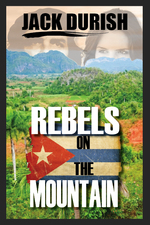
Jack Durish is not your average guy: he's a non-conformist, he's had an amazingly varied life and defines himself as an author, soldier, sailor, Vietnam Veteran, Oath Keeper, Husband, Father, Grandfather - a little too old for a boomer perhaps, but he certainly shares in the rebellious spirit of boomers. As he says, "aging is not for the faint of heart"! I love that!
I met him by chance on the Internet as we both navigated various readers and writers' circles, he's often made some very pointed comments on my blog, and one day, to my total surprise, he emailed me telling me he'd read my book (A Hook in the Sky) and really liked it - to the point of taking the trouble to write a review (see here), something that is always a source of deep pleasure for an author: it's so nice to connect with your readers and find that you're understood and appreciated! Particularly when the appreciation is coming from someone who is himself a good writer...

Today, it’s my pleasure to interview him and he is going to tell us all about his latest book, Rebels on the Mountain, an intriguing historical novel, a spy tale of revolution and romance set in Cuba during the days of Castro's ascent to power, now available in
all e-book formats on Amazon, Barnes and Noble, and iTunes. I’ve been on a
so-called “blog hop” with him, a term I don’t particularly like but what it
means is that he has interviewed me (to see that interview, click here), defining me as a "writer with a mission" - I'm flattered, the mission in question is the work I do to promote boomer lit which I'm convinced is going to be the next big literary genre...But I'm more than happy to return the favor here. Which I don’t
consider a “favor” at all, but something I owe to a remarkable fellow author
and I hope you’ll agree with me that his book is fun reading!
You’ll also find
him on his blog (click here) where he tells you all about Cuba and its recent Fidel
Castro-shaped history and gives you his own very personal opinions about the
world around him and us. And if, after you've read him, you think he doesn’t quite live in the same
world as you, well…that’s what makes it all the more interesting! Writers do have a special view on life or they wouldn't be writers worth reading. I highly
recommend a visit to his blog, you’ll be surprised at what he has to
tell you!
So now, for the
so-called “blog hop” questions:
1.
Give us a one sentence
synopsis.
"Nick Andrews, a U.S. Army spy assigned to unwrap the mystery of diplomatic
failures in Cuba, avoids being entrapped in Castro's Revolution until he is
forced to bury his friends and fight.
2.
Who are the main
characters and who would you like to see portray them in a movie?
There are two kinds: first, the fictional characters :
Nick Andrews: A U.S. Army Ranger and Korean War Veteran who has made a
career of reconnaissance patrols behind the Iron Curtain – possibly portrayed
by Stephen
Amell

Lucia Comas: An American-educated, island-born mulata, daughter of the
second wife of don Carlos Comas, a Cuba sugar plantation owner, and love
interest of Nick Andrews – possibly portrayed by Christina
Milian

Emma Regan: An American socialite whose husband, a retired pediatrician
operates a free clinic on the sugar plantation she inherited, and sister to the
don Carlos Comas' second wife Sigourney
Weaver
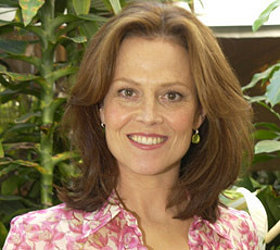
Then the real Historical Characters:
Fidel Castro: The charismatic leader of the revolution that overthrew
the Cuban dictator, Fulgencio Batista – possibly portrayed by Jsu
Garcia
Che Guevara: The Argentinian doctor who became one of Castro's most
notorious lieutenants and his executioner following Fidel's rise to power –
possibly portrayed by Guillermo
Diaz
Ernest Hemingway: Nobel Prize winning author and Havana resident who
mingled freely in the halls of power in Havana and purportedly supported
Castro's revolution – possibly portrayed by William
Hurt
3. That's quite a cast! By the way, let me say that Nick Andrews, the protagonist, is one hell of a guy! Tell us about the story,
but please don't reveal too much.
Nick Andrews uses the cover of a pleasure trip with friends, the Regans – a
retired doctor and his socialite wife who own an estate in Cuba – to infiltrate
the island from its halls of power in Havana to the rebel camp in the mountains
at the eastern end of the island. Unexpectedly, he rekindles a childhood crush
with the island-born niece of the Regans, and makes friends with a loyal
Fidelista rebel. Romance, rum, rumba, and revolution layer themselves into a
thrilling tale of intrigue, action, and suspense.
4.
What inspired you to
write this book and how long did it take?
I was slated to pilot a vessel from Galveston Bay to the Chesapeake, with a
stop in Havana, when I was a young sailor, but the trip was canceled due to
several factors including the fall of the Batista government in Cuba. I suppose
that I never let go of the disappointment of missing that adventure. Thus, I
followed events in Cuba closely and studied the history of the island and its
people during the intervening fifty years. I spent another two years cataloging
and studying my research, and another year and a half to write and edit the
manuscript.
5.
What other books have
you written?
Dream Pirates – Fiction for young readers with impaired reading skills
and new English speakers
WordPerfect: Creative Applications – Technical manual
Infantry School: A Soldier's Journal – Personal memoir
Vietnam: A Soldier's Journal – Personal memoir
Trifles: Literary Dessert – A collection of short stories to be
published soon
6. Yes, you're a techie too! Can't wait to read your short stories... Which authors inspired
you?
Many including...
Ernest Hemingway: for the Voice
Mark Twain: Irony
Charles Dickens: Memorable characters
7. The classics - I couldn't agree with you more. For good writing, you need to aim high! Where can we learn more
about you and your books?
Http://www.jackdurish.com contains my
personal blog as well as my biography, a synopsis of all my books and links to
them, and recommended websites for anyone interested in reading.
8.
How can we follow you?
Twitter, Facebook, Google+, etc.
Google+
9. You're not on Facebook? Hey, I checked it and you are (click here)! You're also on Linked In...Is there anything else you
would like us to know?
I am currently working on my second novel featuring Nick Andrews as a young
soldier in the Korean War. Also, I have been posting to my blog a series of
articles built from my research into Cuba with special emphasis on the
love-hate relationship between the island and the United States.
Most expect a
change in US-Cuban relations when Fidel Castro dies, and Americans will begin
looking forward to visiting this Caribbean paradise which has been off limits
for so many years."
Thanks, Jack, it was wonderful to talk to you! And yes, Cuba is likely to become a major tourist destination - actually, it already is for many people here in Italy where I live. Anyone planning a trip to Cuba should read your book!
Related articles
 Author Interview with Jack Durish(trueknights.wordpress.com)
Author Interview with Jack Durish(trueknights.wordpress.com)

Published on February 20, 2013 08:53
February 18, 2013
The Publishing Industry at a Crossroads: The Agency Model is Dead, What Happens Next?

With the US Department of Justice and the European Commission decisions regarding the so-called "agency model", the case is in fact Apple vs. Amazon, "a kind of capitalist Super Bowl" for the publishing industry, as pointed out by Roger Tagholm in a recent article in Publishing Perspectives. What will happen next is anyone's guess, though several UK publishers are reportedly unhappy, with one going so far as saying that “We are now in a very dangerous situation, thanks to the carelessness of the major publishers.”
Consumers hate price collusion (which is what the agency model looked like) and politicians have obliged. In principle, prices for traditionally published ebooks should now drop across the whole range, leaving less space for self-published indies to fight with their weapon of choice: low prices and going temporarily free.
How far can they drop without hurting the business of traditional publishers? That is what panics them: no one knows how far this price game can go without turning the whole house into a shambles.
On the face of it, indies look like they have the upper hand. As one indie author commented in the Publishing Perspective article, “with a
digital product, the marginal cost of producing one more copy is close
to zero which means they can be priced extremely aggressively.”
I take issue with that. It
sounds like good economics (and I should know, I’m an economist) but in
fact it isn’t.
The question is far more complex. One needs to consider the whole
production and distribution chain. It is true that with the digital
revolution, Amazon (and others) are able to take care of distribution at
very low costs, so low that they are almost invisible (as long as you don’t ask them to distribute a super
complex e-book with lots of illustrations etc – then you’ll find an
extra charge eating in your royalties). That is the one, single big
advantage resulting from the digital revolution. No doubt about it.
However the rest is largely
unchanged, let me explain.
For an indie, production costs are minimal and could be even close to
zero only under some very special (and rare) circumstances:
(1) you
need to be well-off or living on your pension and writing for the fun of
it, not needing to price in the cost of your own efforts or the
maintenance/cost of running your computer;
(2) you’re such a remarkably
talented indie that you don’t need to spend any money on any editing or
proof-reading or on marketing to help book discovery, which is patently
absurd;
(3) you’ve sold so many copies right off the bat that you’ve
paid back your initial costs of production/distribution/marketing and
now you can engage in vicious price cutting to your heart’s content and
without feeling hurt.
Is this a likely situation? For some indie best sellers, may be. For
most, this is not the case. And for a newbie who needs to earn a living,
the situation does not present itself in this way at all, especially
considering the extra marketing efforts required of him/her to enable
book discovery. Believe me, with no marketing, your e-book, no matter how good, is going to be dead, gathering internet dust on
its virtual shelf.
Publishers have huge upfront costs that they can’t avoid if they want to
maintain their presence on the market and their reputation as quality
book gatekeepers.
Now, certainly they could economize and cut back on
some of these costs. Perhaps they could negotiate better terms with brick and mortar book stores (but of course these are fast disappearing - even big Barnes and Noble is set to soon close down some 200 stores in the US). They could try their hand at playing the online game and try to turn the digital revolution to
their advantage the way Amazon has done. It's a little late in the game, but still...If they set their mind to it, there’s a lot to learn from the way Amazon runs its business.
For example, Bookish has (finally!) been set up by Simon and Shuster, Hachette and Penguin to try and make some of the digital features
work for them, in particular to help in book discovery. A website that could solve book discovery would truly help in removing the one stumbling block in book marketing. Unfortunately for Bookish, the book data base is far too small (250,000 volumes to date) to make
the website of real use in book discovery as I found out when I tried
it and looked for a book that I might want to read – I typed in the search box some classics that I like as a guide for them to decide what titles to offer me and they didn't come up! Yet, I had picked some really standard books like Tolstoy's War and Peace...All they have are their own contemporary titles. Fair enough, but not good enough. Often one doesn't remember a contemporary title: I imagine that most people are like me, they can remember their classics more easily. And even if that's not the case, surely the classics should be used in any search system supposed to uncover the kind of book you like to read?
So, for publishers, the threat of having to keep
ebook prices too low for comfort looms large, given the sharp
competition from indies who are free from the cost strictures publishers
labor under. Meanwhile, Amazon doesn’t care…or does it?Amazon has at its (virtual) fingertips an astounding amount of data regarding consumer preferences, and I'm betting that they have only begun exploiting that data and that much more is yet to come.
And that's yet another reason that explains the growing discomfort of traditional publishers...
Related articles
 Why was Agency Pricing Established? To Save our Bookstores(goodereader.com)
Why was Agency Pricing Established? To Save our Bookstores(goodereader.com) Apple Continues to Fumble at Selling eBooks(the-digital-reader.com)
Apple Continues to Fumble at Selling eBooks(the-digital-reader.com) Smashwords Authors Gain Seat at the Merchandising Table with the Apple iBookstore's Breakout Books Promotion(smashwords.com)
Smashwords Authors Gain Seat at the Merchandising Table with the Apple iBookstore's Breakout Books Promotion(smashwords.com)

Published on February 18, 2013 08:24
February 12, 2013
2013: The Pope Resigns, is it the Year of Abstention?
The Pope has resigned, saying he feels too old and sick to handle the responsibilities of his function as leader of one billion Catholics - earning the disapproval of die-hard extremists who view the Papal function as a calling, not something that can be turned down. Curiously, Sky TV in Italy has been running this month that 2011 film Habemus Papam, done by Nanni Moretti with that wonderful actor Michel Piccoli in the role of the resigning Pope. For those who haven't seen it, here's the official trailer, it will give you a taste of that excellent film:
No, I don't think this Pope resigned because of "something regarding his childhood". This is not stuff for psycho-analysis. This Pope resigned because he felt truly ill - I happened to be at St Peter's last Saturday at a ceremony celebrating the 900 years of the Order of Malta (1113 was the date of the Papal bull that recognized the Order founded by the Blessed Gerard). The cathedral was filled with over 4500 members and volunteers of the Order in full regalia, it was a wonderful sight but the Pope, although he spoke very well with a strong voice, undoubtedly looked sick and, dare I say it, like a shriveled old man. But the point is this: here is a man of true integrity and absolute moral values. If he sees that he cannot fulfill his obligations because of physical impediments, especially obligations entrusted on him by God as the leader of all Catholics, then for him, it is a moral duty to resign. Full stop.
I admire him for that.
This is nothing like abstention from duties. Abstention that alas, is stalking our lives as citizens of a democracy. Here in Italy, in less than two weeks, people are called to vote the next government and for many, the choice is impossible. They don't like the left and the candidate the right has to offer is Berlusconi who, as I argued in my previous post, has let them down. I am afraid that the biggest party in Italy is likely to be the one of abstentions...
The trouble is: abstention is a choice - just as much as voting is. When you abstain from voting, you are giving up your right to exercise your voice as a citizen. You are silent. You are letting others decide for you. Because you don't participate, your country is run by that many fewer people. A minority viewpoint could prevail. You are putting democracy at risk.
This year, there will be in Europe many occasions to vote: most notably, elections are coming up in Germany in September. Will Angela Merkel win? She is highly regarded in her country for having saved German taxpayers' money - yet she is the one politician most responsible for having plunged Europe in recession because of her relentless austerity demands. Demands that were largely the result of unfounded fears that austerity was required to avoid inflation and a repeat of what Germany lived through in the 1920s. And recession in Europe is not something that helps German exports: the US and Chinese markets are important for German industry, but Europe is even more important...Will people stay home disgusted and not vote, or will they go out and renew their government, making sure that it addresses current issues and not past ones, like that ridiculous fear of seeing the 1920s repeating themselves?
2013 could indeed be the Year of Abstention, the Year of Lost Opportunities for Change and that would be a pity...We don't want Berlusconi back, do we?
Related articles
 Habemus Papam, Still(catholic.com)
Habemus Papam, Still(catholic.com)
 What happens now: choosing a new pope(abc.net.au)
What happens now: choosing a new pope(abc.net.au)
 First pope since 1415 to resign as leader of Catholic Church...(news.sky.com)
First pope since 1415 to resign as leader of Catholic Church...(news.sky.com)


No, I don't think this Pope resigned because of "something regarding his childhood". This is not stuff for psycho-analysis. This Pope resigned because he felt truly ill - I happened to be at St Peter's last Saturday at a ceremony celebrating the 900 years of the Order of Malta (1113 was the date of the Papal bull that recognized the Order founded by the Blessed Gerard). The cathedral was filled with over 4500 members and volunteers of the Order in full regalia, it was a wonderful sight but the Pope, although he spoke very well with a strong voice, undoubtedly looked sick and, dare I say it, like a shriveled old man. But the point is this: here is a man of true integrity and absolute moral values. If he sees that he cannot fulfill his obligations because of physical impediments, especially obligations entrusted on him by God as the leader of all Catholics, then for him, it is a moral duty to resign. Full stop.
I admire him for that.
This is nothing like abstention from duties. Abstention that alas, is stalking our lives as citizens of a democracy. Here in Italy, in less than two weeks, people are called to vote the next government and for many, the choice is impossible. They don't like the left and the candidate the right has to offer is Berlusconi who, as I argued in my previous post, has let them down. I am afraid that the biggest party in Italy is likely to be the one of abstentions...
The trouble is: abstention is a choice - just as much as voting is. When you abstain from voting, you are giving up your right to exercise your voice as a citizen. You are silent. You are letting others decide for you. Because you don't participate, your country is run by that many fewer people. A minority viewpoint could prevail. You are putting democracy at risk.
This year, there will be in Europe many occasions to vote: most notably, elections are coming up in Germany in September. Will Angela Merkel win? She is highly regarded in her country for having saved German taxpayers' money - yet she is the one politician most responsible for having plunged Europe in recession because of her relentless austerity demands. Demands that were largely the result of unfounded fears that austerity was required to avoid inflation and a repeat of what Germany lived through in the 1920s. And recession in Europe is not something that helps German exports: the US and Chinese markets are important for German industry, but Europe is even more important...Will people stay home disgusted and not vote, or will they go out and renew their government, making sure that it addresses current issues and not past ones, like that ridiculous fear of seeing the 1920s repeating themselves?
2013 could indeed be the Year of Abstention, the Year of Lost Opportunities for Change and that would be a pity...We don't want Berlusconi back, do we?
Related articles
 Habemus Papam, Still(catholic.com)
Habemus Papam, Still(catholic.com) What happens now: choosing a new pope(abc.net.au)
What happens now: choosing a new pope(abc.net.au) First pope since 1415 to resign as leader of Catholic Church...(news.sky.com)
First pope since 1415 to resign as leader of Catholic Church...(news.sky.com)

Published on February 12, 2013 01:56



